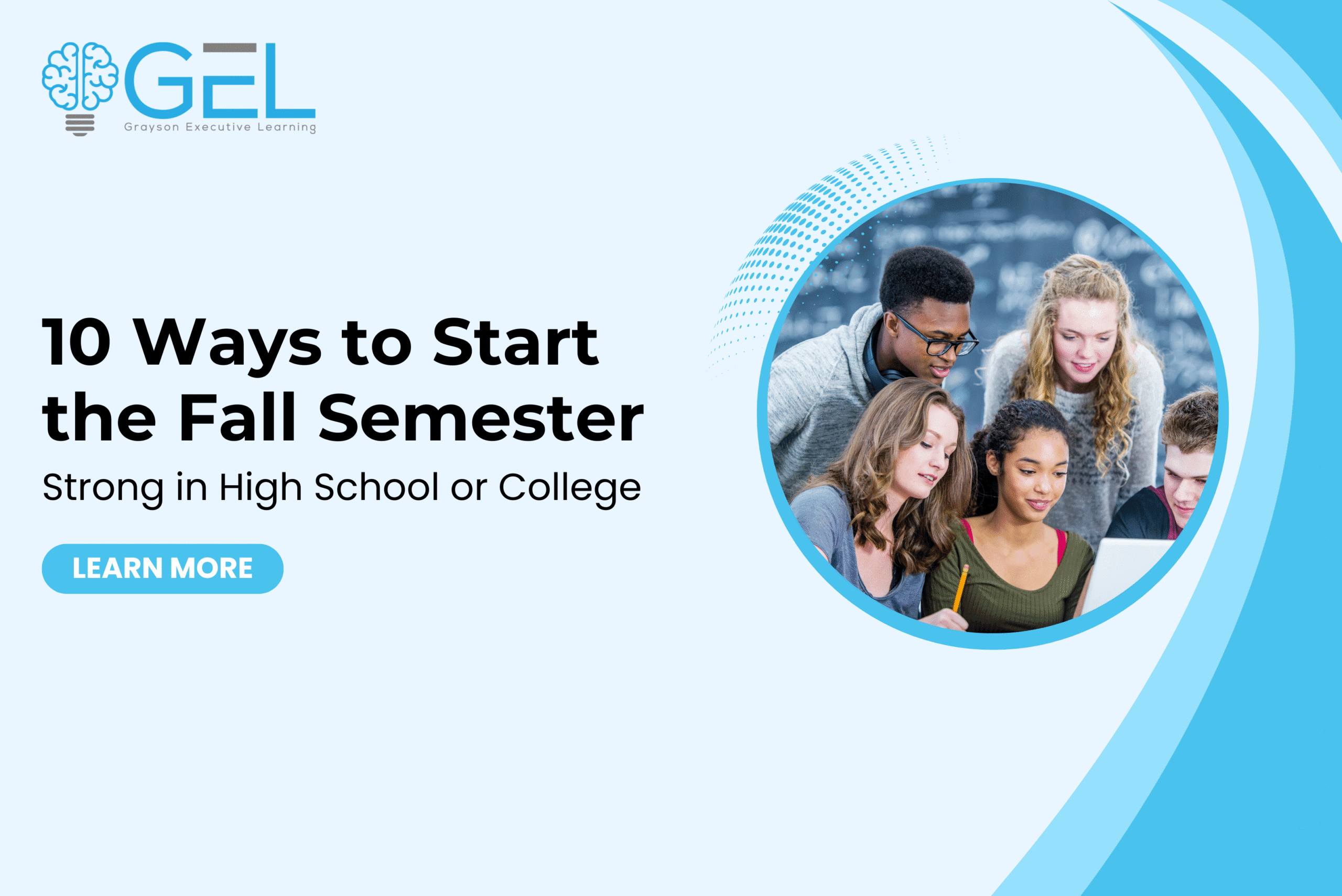The beginning of a new school year brings a mix of excitement and anxiety, especially for students balancing academic pressure, extracurriculars, and growing independence. Whether your teen is stepping into high school or navigating college, the first few weeks of the fall semester are vital for setting the tone and pace of the months ahead.
At Grayson Executive Learning (GEL), we help students build executive function skills that strengthen focus, time management, and follow-through. This guide shares ten research-informed, parent approved strategies your student can use to start strong and stay strong all semester long.
Build a Master Calendar Early
Before assignments pile up, help your teen create a high school or college semester calendar that includes all major deadlines, exams, and projects. Seeing the big picture upfront makes it easier to plan ahead and avoid last minute panic. Digital tools like Google Calendar or Notion work well, but even a paper planner can do the trick; what matters is consistent use.
Why it works: Research shows that mapping out tasks reduces stress and improves performance.
Review the Syllabus Like a Study Map
Encourage your student to go beyond a quick skim. Highlight grading breakdowns, project timelines, and attendance policies. Treat the syllabus like a roadmap for the course and revisit it often.
Why it works: This promotes planning and metacognition, two key executive function skills.
Set Personal Goals for the Semester
Sit down together and ask: What does success look like this semester? Goals don’t have to be strictly academic. Maybe it’s joining a club, getting better sleep, or speaking up more in class.
Why it works: Goal setting boosts motivation and helps students tie daily habits to long term success.
Visit Office Hours Before the First Exam
Many students wait until they are struggling to reach out to a teacher or professor. Showing up early can build confidence and reduce anxiety in the future.
Why it works: Office hours visits support self-advocacy and communication skills.
Create Healthy Weekly Routines
Help your teen block out time for meals, sleep, exercise, study, and breaks. Think of it as creating a weekly rhythm, not a rigid schedule.
Why it works: Routines reduce decision fatigue and support self-regulation.
Use the Pomodoro Method
This time management technique suggests 25 minutes of focused work followed by a 5-minute break. After four rounds, take a longer 15 to 30 minute rest.
Why it works: It improves sustained attention and prevents burnout.
Organize a Dedicated Study Zone
Whether at home, in a dorm, or at the library, students need a distraction-free workspace. Encourage them to personalize it with a lamp, whiteboard, or noise-reducing headphones.
Why it works: A defined workspace strengthens habit cues and focus.
Check Grades Weekly and Plan Accordingly
Encourage regular grade tracking to identify areas that need extra attention. Midterms are too late to catch small slips.
Why it works: Accountability supports timely adjustments and course correction.
Build in Breaks and Self Care
Starting strong does not mean nonstop study. Hobbies, social time, movement, and mindfulness help recharge the mind.
Why it works: Breaks support emotional regulation and improve overall performance.
Don’t Wait to Ask for Help
Normalize reaching out for academic support, mental health resources, or executive function coaching.
Why it works: It reinforces self awareness and a growth mindset.
Important Stats for Context
- Nearly every sixth grade classroom raises hands when asked if students feel stressed by schoolwork.
- Brief mindfulness programs in adolescence can cut inhibition errors by 50 percent and increase working memory by nearly 1 standard deviation.
- In survey studies, routines have been associated with a 7 percent increase in test reaction time accuracy.
How Grayson Executive Learning Can Help
Grayson Executive Learning (GEL) is a boutique Academic and ADHD/Executive Function Coaching practice that specializes in providing premium one-on-one academic coaching services to high school and college students with ADHD and executive function difficulties.
Click here to learn how we can help your student truly reach their academic potential while developing critical life and independence skills.
We look forward to serving you.


